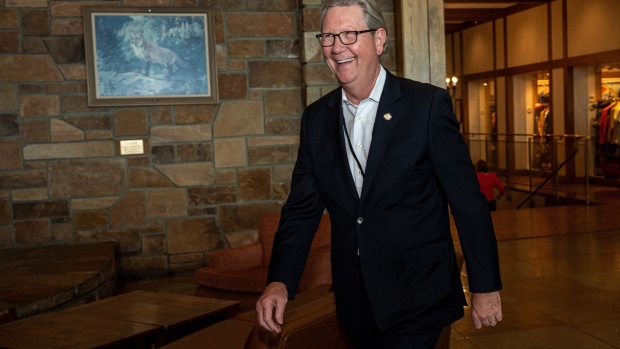Feb 26, 2024
Fed’s Schmid Urges Patience on Cuts as Inflation Fight Continues
, Bloomberg News

(Bloomberg) -- Federal Reserve Bank of Kansas City President Jeffrey R. Schmid said the US central bank should be patient in cutting interest rates with inflation above its 2% target and the job market still strong.
In his first major speech since taking the job six months ago, Schmid also said he’s in no hurry to stop the ongoing reduction of the Fed’s balance sheet.
“With inflation running above target, labor markets tight, and demand showing considerable momentum, my own view is that there is no need to preemptively adjust the stance of policy,” he said in prepared remarks Monday at an event in Oklahoma City, Oklahoma. “I believe that the best course of action is to be patient, continue to watch how the economy responds to the policy tightening that has occurred, and wait for convincing evidence that the inflation fight has been won.”
Schmid was named to lead the Kansas City Fed last August. The former president and chief executive officer of the Southwestern Graduate School of Banking Foundation at Southern Methodist University’s Cox School of Business was a longtime banker and bank regulator.
The new president’s emphasis on bringing down inflation suggests he could become one of the more hawkish officials on the Federal Open Market Committee, in line with the bank’s past two presidents, both of whom dissented a number of times as hawks.
Policymakers voted unanimously to leave interest rates unchanged in a range of 5.25% to 5.5% last month, and Chair Jerome Powell and other Fed officials have signaled that a rate cut in March is unlikely.
“When it comes to too high inflation, I believe we are not out of the woods yet,” Schmid said. “The drop in inflation has largely been driven by reductions in energy and goods price inflation as oil markets rebalanced and supply chains healed.”
Speaking to the Economic Club of Oklahoma City, Schmid said a moderating labor market with easing wage growth will likely be needed to restore price stability in the services sector.
Schmid also said he wasn’t in a rush to halt the ongoing reduction in the size of the Fed’s balance sheet and highlighted risks from having a large asset portfolio. That could tend to suggest monetary and fiscal policy are intertwined and potentially threaten the Fed’s independence, he said.
“Once a crisis has passed, it should be a priority for the Fed to reduce its balance sheet and to lessen its footprint in financial markets,” he said.
©2024 Bloomberg L.P.


